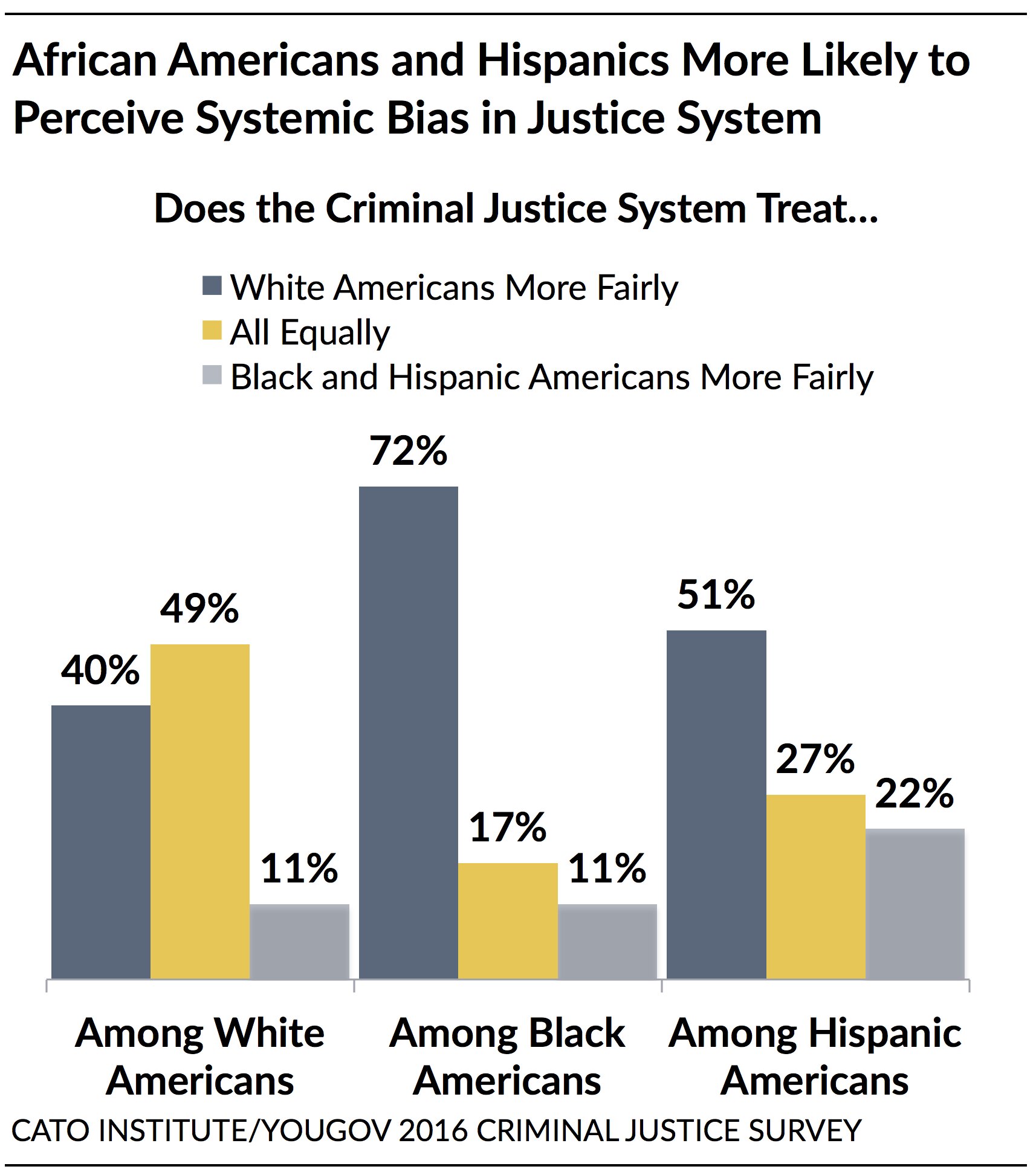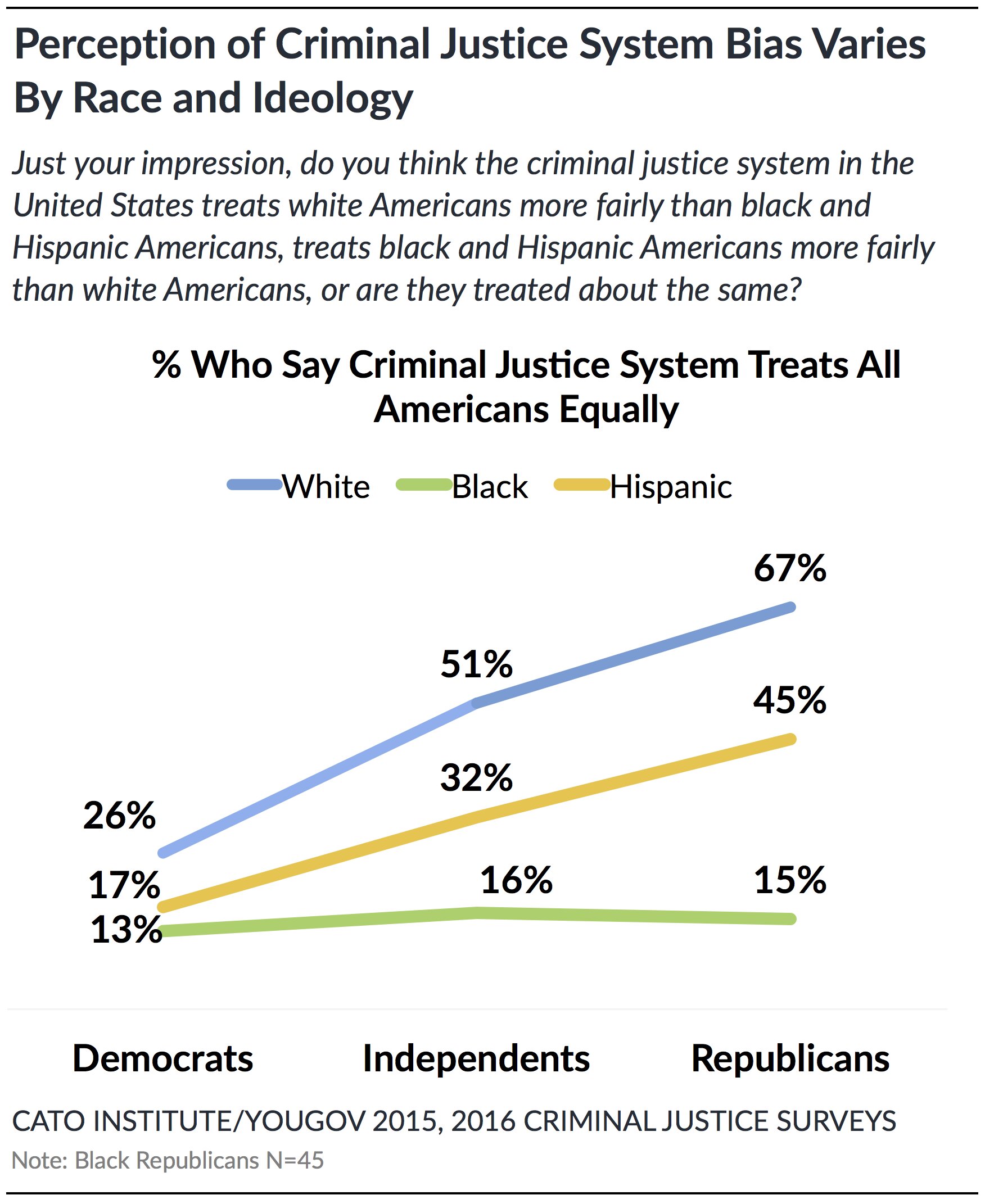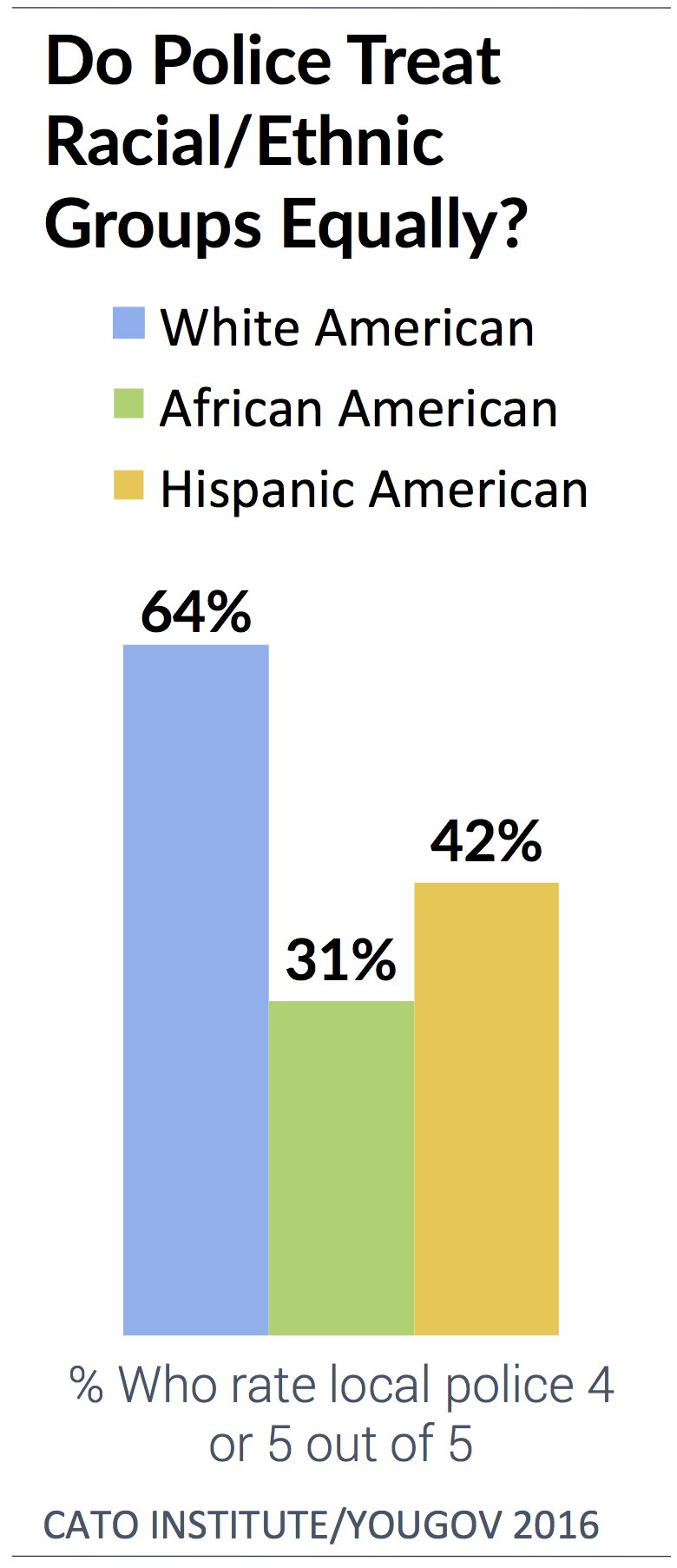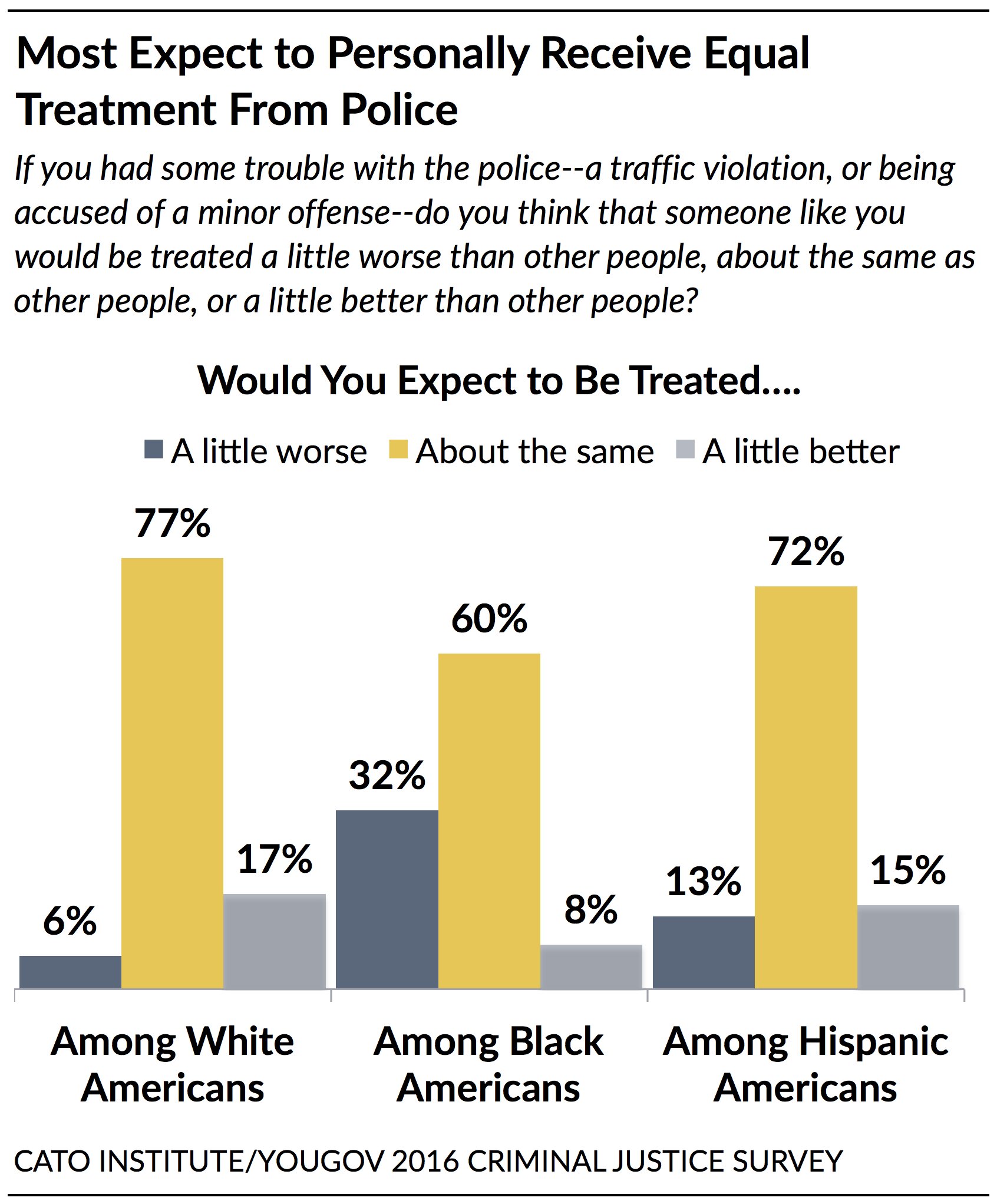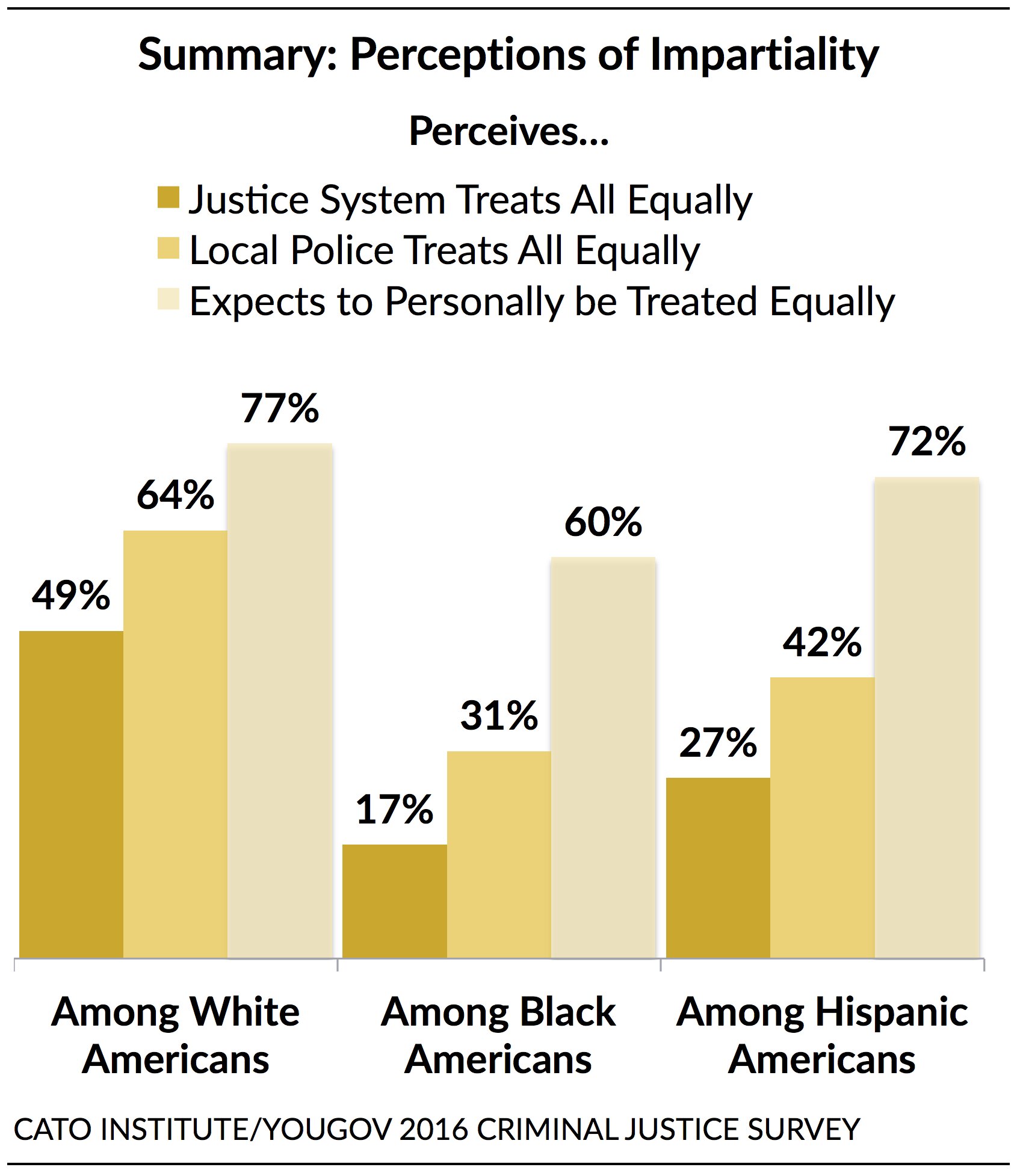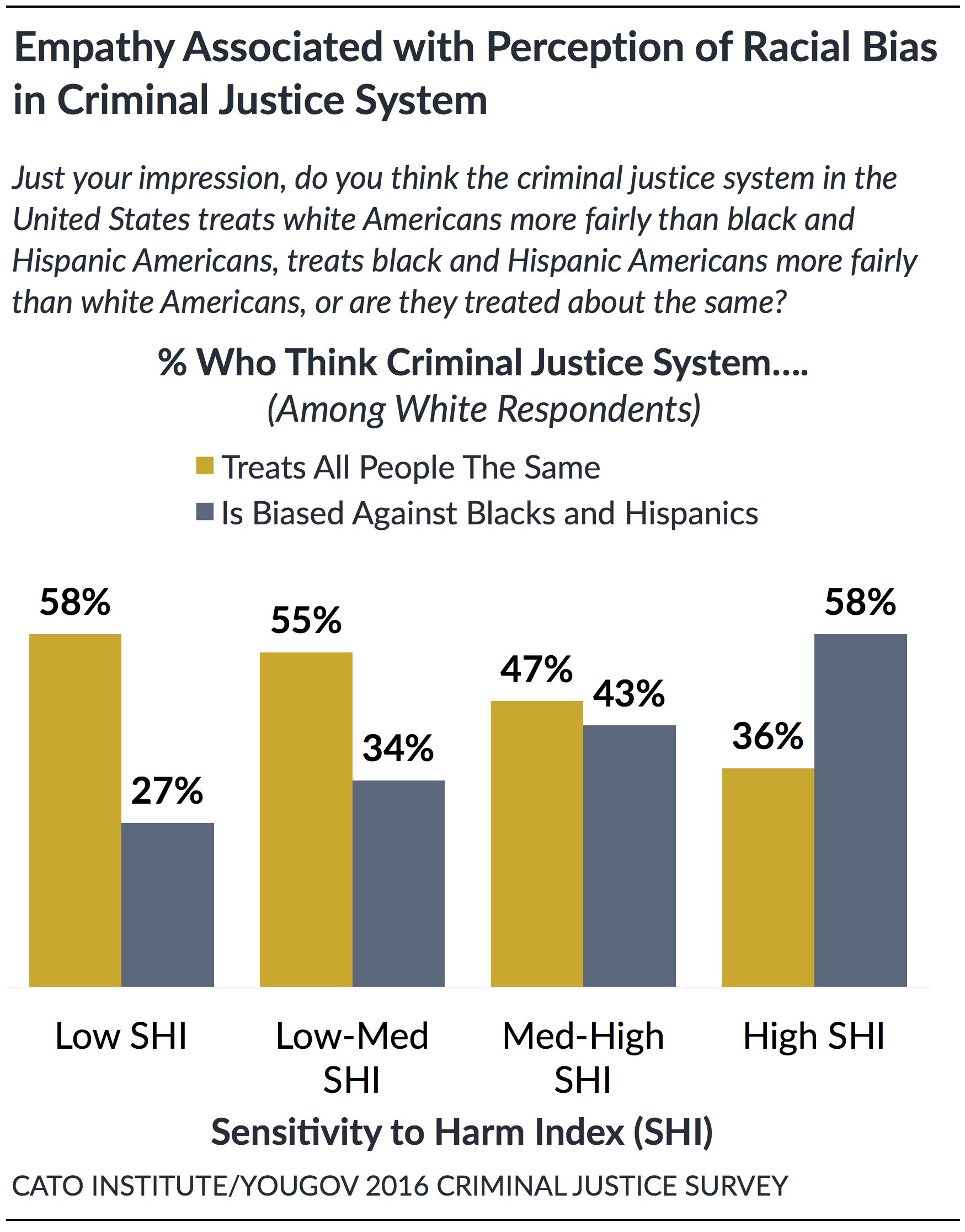Fully 58% of Americans say the criminal justice system fails to treat all individuals equally, including 45% who believe the system gives preference to white Americans and 13% who think the system treats black and Hispanic Americans better. Less than half (42%) of Americans believe the justice system is impartial. However, a majority (56%) give their local police departments high marks for "treating racial and ethnic groups equally."42
Perceptions of bias vary widely by race, ethnicity, and partisanship. About half (49%) of white Americans believe the criminal justice system treats everyone about the same. Only 17% of black Americans and 27% of Hispanic Americans agree. Instead, a strong majority (72%) of African Americans, a slim majority of Hispanics (51%), and 40% of Caucasians believe the justice system gives preferences to whites. About 1 in 10 black and white Americans and 2 in 10 Hispanic Americans think the justice system offers greater leniency to minorities.
More than two-thirds (69%) of Democrats say the system favors whites over blacks and Hispanics while 21% say the system treats everyone equally. But, 64% of Republicans say the system treats everyone the same while 21% think the system is biased in favor of whites. Independents are divided: 45% think the system is fair, and 41% think the system gives preference to Caucasians.
Here again, race matters more than partisanship. Although white Republicans (67%) are 41 points more likely than white Democrats (26%) to believe the system treats everyone equally, black Republicans (15%) are about as likely as black Democrats (13%) to think the system is impartial. Hispanics fall in between, with Hispanic Republicans 28 points more likely than Hispanic Democrats to believe the system is fair (45% vs. 17%).43 Ultimately, white Republicans are the only group that solidly believes the justice system treats all citizens fairly.
These data indicate partisan ideology is correlated with perceptions of impartiality in the justice system, but primarily for whites and Hispanics. Hispanic and white Republicans are both more likely than Hispanic and white Democrats to believe the system is fair. However, black Republicans and black Democrats have similar views about the system's fairness. Why? African Americans may have different personal or vicarious experiences with the police.
Local Police Departments These confidence gaps extend to evaluations of local police departments. While 64% of white Americans highly rate their local police for impartiality, only 31% of African Americans and 42% of Hispanics agree.44 Republicans (78%) are also considerably more likely than Democrats (40%) and independents (57%) to highly rate their local police for impartiality.
Urban residents (47%) are also less likely than suburban (62%) and rural residents (59%) to believe the police treat all groups the same. This pattern generally holds across racial groups: whites living in suburbs are about 19 points more likely than whites living in cities to highly rate their local police for impartiality (70% vs. 51%). Suburban Hispanics (54%) are 14 points more likely than Hispanics living in cities (40%) to agree. Blacks living in cities are slightly more likely (33%) than blacks living in suburbs (25%) to highly rate their local police for impartiality.
Belief that one's local department suffers from racial bias strongly correlates with favorability toward the police. Among those who highly rate their department for impartiality, 83% have a favorable view of the police.45 However, only 31% of those who are not confident of such impartiality have a favorable view.
Personal BiasAlthough most Americans believe the justice system suffers from bias, 75% expect the police will treat them the same as anyone else for a traffic violation or minor offense. Ten percent (10%) of Americans think police would treat them worse than other people, and 15% expect they would be treated better.
Majorities of black (60%), Hispanic (60%), and white (77%) Americans personally expect to receive equal treatment from police. However blacks and Hispanics comprise a disproportionate share of those who expect worse treatment. African Americans (32%) are about five times more likely, and Hispanics (13%) twice as likely, as white Americans (6%) to expect worse treatment.
Notably, although only a third of African Americans and 42% of Hispanics highly rate their police departments for impartiality, majorities of both groups (60% and 72% respectively) believe they personally would be treated the same as other people.46 This suggests that expectations about personal treatment are not sufficient to explain perceptions of bias in the department overall.
Predictably, those who expect to receive equal treatment are more favorable toward the police than those who expect worse treatment by a margin of 70% to 29%.
Taking these results together, Americans are more likely to perceive racial bias in the criminal justice system overall than at the level of their local police department. They are least likely to expect to personally be treated inequitably. Ultimately, perceptions of systemic bias more strongly and negatively correlate with favorability toward the police than do personal expectations. It is important for people to believe the system is fair — even to other people — for the police to have legitimacy.
Who Believes Charges of Racial Bias? What might lead a person to believe disparate treatment exists if one doesn't personally experience it? Perhaps an above average concern for others experiencing harm may lead one to be more apt to believe charges of racial bias.
To investigate, the author created a Sensitivity to Harm Index (SHI), based on the Care/Harm Foundation in Moral Foundations Theory.47 The SHI is a composite scale based on averaging responses to two questions that measure people's sensitivity to others' suffering, without explicitly asking about police or race. (See Appendix F for question wording.)For instance, respondents who strongly agree that "compassion for those who are suffering is the most crucial virtue" score higher on the SHI scale. SHI scores do not vary considerably across demographics, except that women tend to have higher scores than men.
Individuals who score high on the Sensitivity to Harm Index (SHI) are far more likely to believe racial bias is a problem in the criminal justice system. For instance, 58% of whites with high SHI scores believe the justice system is biased against blacks and Hispanics compared to 27% among those with low scores.48 Whites who score low on SHI are far more likely to say the system treats everyone the same than those who score high (58% vs. 36%). These results suggest that people who tend to empathize may be more sensitive to charges of racial bias in police encounters.
Notes:
42 High ratings are defined as answering 4 or 5 on a scale of 1-5: "How good a job is the police department in your community doing for each of the following, using a scale of 1 to 5 where 1 means you think it's doing a poor job and 5 means you think it's doing an excellent job."
43Data about perceptions of systemic bias by race/ethnicity and partisanship come from the combined June 2016 and November 2015 national surveys (N=4000), which offer greater precision and smaller margins of error for subgroups. (Unweighted: Black Republicans=45, Hispanic Republicans=165, White Republicans=1193, Black Democrats=630, Hispanic Democrats=409, White Democrats=634.)
44 High ratings are defined as answering 4 or 5 on a scale of 1-5: "How good a job is the police department in your community doing for each of the following, using a scale of 1 to 5 where 1 means you think it's doing a poor job and 5 means you think it's doing an excellent job."
45 High ratings are defined as answering 4 or 5, and low ratings are defined as answering 1 or 2, on a scale of 1-5: "How good a job is the police department in your community doing for each of the following, using a scale of 1 to 5 where 1 means you think it's doing a poor job and 5 means you think it's doing an excellent job."
46 Sixty-four percent of white Americans highly rate their local police department for impartiality, while 77% expect they personally would be treated like anyone else.
47 For further discussion of Moral Foundations Theory, see Jonathan Haidt, The Righteous Mind: Why Good People Are Divided by Politics and Religion (New York: Pantheon Books, 2012).
48 High Sensitivity to Harm Index (SHI) scores are defined as those in the top quartile, while low SHI scores are defined as those scoring in the bottom quartile.
